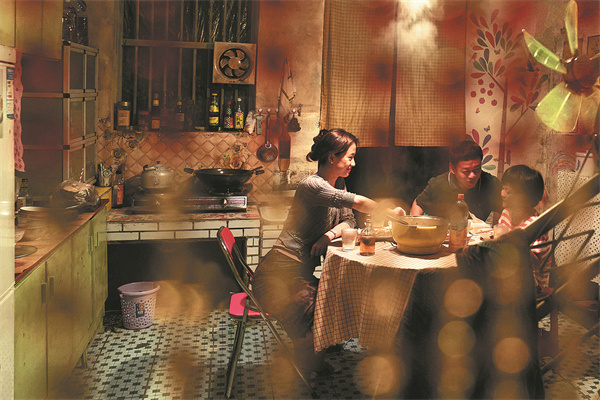

Real life scenes
Wu, 32, graduated from the Department of Sculpture at the School of Art and Design, Hainan University. He doesn't feel that there is a big difference between filmmaking and sculpture, as both require thought and creation. "I feel that sculpture and film are in some ways just a medium, and telling a story through sculpture is basically the same as through film," Wu says.
Wu hopes to dedicate the feature film to the 10 years he has lived in the island province.
Absence is about life and making choices in difficult situations. It tells the story of Han Jiangyu (acted by Li Kangsheng), who returns to his hometown after a 10-year absence and tries to rekindle his relationship with former lover Su Hong (Li Meng). Han's long absence has created a gap between him and Su, and hardship and toil has also made Su emotionally closed off.
Han finds that he is out of place in the surrounding environment and his interpersonal relationships — even his methods of communication and language are out of touch. Although his efforts seem in vain, he doesn't give up trying to rebuild relationships.
"Everyone has experienced ups and downs in their past and gone through periods when they have had to escape, times when they have regretted something, or situations when they have had no choice in their actions," Wu says.
"With constant changes around me, I was at a loss in terms of my career and family, emotionally and spiritually. I longed to fit in. In a sense, making Absence is like finding a spiritual home to live in."
In the film, Su's plan to buy an apartment forces Han and her to face up to a crisis, while perseverance empowers them to carry on with their lives and make up for each other's absence.
Wu explains that the film is really about building relationships with the people around you, and returning to a spiritual home.
"The movie aims to provoke a thought — how we can hold on to some connectivity when we're facing massive changes, such as urbanization," he says. "We can easily drift with the current and feel lost in those transitions."
The story is not set in a particular year, but the social background of it is the microcosm of Hainan island, where Wu has lived in recent years. Since the establishment of the province in 1988, Hainan has been developing at a fast pace. It's like a test field in the country, according to Wu.
People's lives have been changed in Hainan. Some have encountered business or property failures and they may not know where to go, Wu says. "I instinctively feel that it's necessary to record this important history," he adds.
The film's cinematography has won acclaim. Retro is a keyword to describe its visual effects: Under the yellow-green filter, slot machines, tropical floral shirts and barbershops easily take audiences back decades.
There are also many animal elements in the film. The audiences will see a picture of a huge cheetah on the wall, wolf tattoos on a man's chest, birds in a building carrying branches, ducks swimming, tadpoles sleeping, and a flock of sheep in an abandoned building.
"To me, the movie is about building a spiritual home. There is only 'animal instinct' without logic," Wu says. "I want to avoid some of the traditional visual experiences, and maybe it's interesting to look at people from the perspective of nature."